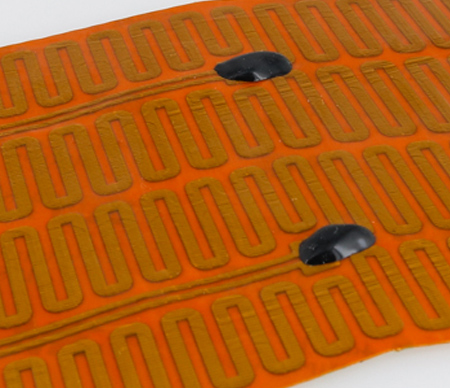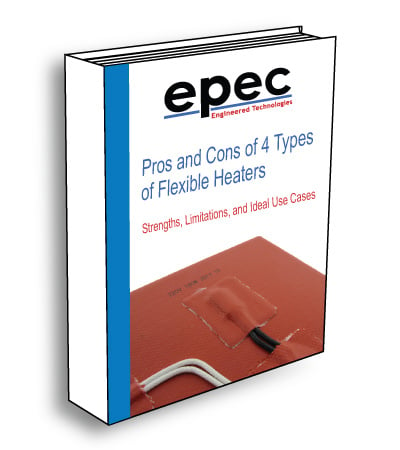
Value-Added Features of Flexible Heaters
Flexible heaters are heating elements that are designed to be flexible and adaptable to fit the shape of the object they are heating. This makes them a versatile and efficient solution for a wide range of applications, including medical devices, aerospace, automotive, and electronics.

Customizable Features
While flexible heaters are already highly customizable, there are several value-added features that Epec Engineered Technologies can add to further enhance their performance and functionality.
Temperature Sensors
One of the key benefits of adding temperature sensors to flexible heaters is the ability to control the temperature more precisely. Temperature sensors can be integrated directly into the heater element or placed in close proximity to the element. This allows for real-time monitoring and adjustment of the temperature, ensuring that the heater stays within the desired temperature range.
Temperature sensors are especially useful in applications where temperature accuracy is critical, such as medical devices, food processing equipment, and aerospace applications.
Custom Shapes and Sizes
Flexible heaters can be manufactured in a variety of shapes and sizes to fit specific applications. This is accomplished by using different materials, coatings, and fabrication methods to create a heater element that is precisely tailored to the desired shape and size. This customization provides several benefits, including increased efficiency, reduced energy consumption, and reduced waste.
For example, a custom-shaped heater that fits precisely around a component will provide more efficient heating, reducing energy consumption and saving money over time.
Adhesive Backing
Adding an adhesive backing to flexible heaters allows for easy installation on a variety of surfaces. The adhesive backing can be applied to one or both sides of the heater, making it easy to attach to any surface. This is especially useful in applications where the heater needs to be installed quickly and easily, such as in medical devices or automotive applications. Some of the most common PSAs from 3M that we use are:
- 3M 467MP: A high-performance adhesive that is commonly used in flexible heaters. It has excellent temperature resistance, withstanding temperatures up to 400°F (204°C), and is suitable for bonding to a variety of surfaces, including metals, plastics, and composites. 3M 467MP is known for its excellent shear strength, providing a strong and reliable bond even under stress.
- 3M 9471LE: A double-sided adhesive that has a strong bond to a variety of surfaces, including metals, plastics, and composites, and is known for its excellent temperature resistance, withstanding temperatures up to 300°F (149°C). 3M 9471LE is also resistant to chemicals, making it suitable for use in harsh environments.
- 3M 9448A: A double-sided adhesive that has a strong bond to a variety of surfaces, including metals, plastics, and composites and is suitable for use in a wide range of temperatures, from -40°F (-40°C) to 200°F (93°C). 3M 9448A is known for its excellent initial tack, providing a strong bond even on difficult-to-bond surfaces.
Multi-Zone Heating
Flexible heaters can be designed with multiple heating zones, which can be independently controlled to provide more precise heating. This is useful in applications where the temperature requirements vary across different areas of the object being heated. For example, a medical device might require different temperatures in different areas to achieve the desired therapeutic effect.
Multi-zone heating can also help to reduce energy consumption by focusing the heat where it is needed most.
Waterproofing
Flexible heaters can be designed with a waterproof coating or encapsulation, allowing them to be used in applications where exposure to moisture or water is a concern. This is especially important in outdoor or marine applications where the heater may be exposed to water or other environmental factors.
Waterproofing can also help to prolong the life of the heater by protecting it from damage caused by moisture or water.
Anti-Static Properties
Anti-static properties are important in applications where static electricity can be a concern, such as in electronics manufacturing or cleanroom environments. The conductive coating or material helps to dissipate static electricity, reducing the risk of damage to sensitive components or materials.
Insulation
An insulating layer to prevent heat loss and contain the heat within a specific area is useful in applications where heat needs to be isolated or contained to prevent damage to surrounding components or materials. The insulating layer can be made from a variety of materials, including fiberglass, ceramic, or silicone, depending on the specific application requirements.
Encapsulation
Encapsulation is a process in which the heater is covered with a protective layer of material that prevents heat from escaping and protects the heater from external factors such as moisture, dust, and mechanical damage.
Encapsulation of the flexible heater can be done using different methods, including adhesive bonding, molding, or lamination. Adhesive bonding involves applying an adhesive material to the surface of the heater and then attaching the encapsulation material. Molding involves using a mold to shape the encapsulation material around the heater, while lamination involves applying a layer of encapsulation material to the surface of the heater using pressure and heat.
One-sided encapsulation can be useful in applications where it is necessary to direct heat to a specific area or to prevent heat from escaping into the surrounding environment. For example, in medical devices, encapsulating one side of the flexible heater can help to control the temperature of the device and prevent burns or discomfort to the patient. In industrial applications, one-sided encapsulation can be used to contain the heat generated by the heater, reducing energy consumption, and improving efficiency.
Performance, Functionality, and Versatility
The value-added features that Epec Engineered Technologies can add to flexible heaters are vast and varied. By adding these features, the performance, functionality, and versatility of flexible heaters can be enhanced to meet the specific needs of each application.
Whether it's temperature sensors for precise control, custom shapes for improved efficiency, or waterproofing for outdoor use, flexible heaters offer a wide range of customization options to meet the demands of any industry. As technology continues to advance, we can expect even more value-added features to be developed and integrated into flexible heaters.
Elevate Your Heating Solutions!
Experience unparalleled flexibility, precision, and efficiency in heating with our customizable flexible heaters. From medical to aerospace and electronics, every detail counts. With precise temperature control, adaptable shapes, and specialized features – from waterproofing to anti-static properties – we ensure your application heats up to perfection.
Request a Quote Request Design Support Request More Information








